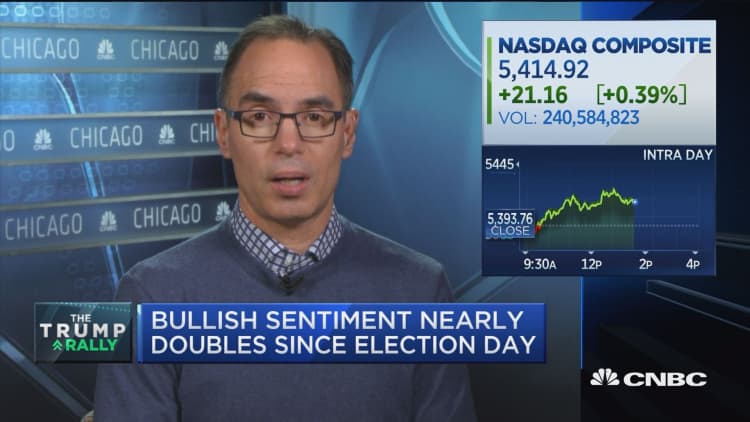
The Trump rally has all the signs of a late-stage bull market run — pent-up enthusiasm bringing the last of the skeptics off the sidelines for one final runup that ultimately spells the end.
While that may well be the case, it could take a while to unravel.
Donald Trump's improbable election brought with it an equally unlikely market rally, with the Dow Jones industrial average jumping more than 7 percent since and the small-cap exploding more than 15 percent since the day after the election.
Money has come pouring in from the sidelines. Exchange-traded funds posted their single biggest inflows ever for November with a net $49.1 billion streaming into ETFs that track U.S. stock indexes.
It all sounds good for now. But for Trump, it's reasonable to wonder whether he's simply the beneficiary of timing that soon will run out.
"Donald Trump is a victim of being elected late in the cycle, with multiples extended and the Fed now a headwind," David Rosenberg, chief economist and strategist at Gluskin Sheff, wrote in his daily note to clients. He was referencing the high price-to-earnings levels in the market, as well as the likelihood that the U.S. central bank probably will be raising its overnight interest target next week, with more hikes to come in 2017.
'Hope-and-faith-based rally'
However, momentum is a tough factor to fight when it comes to an investing world that so often is heavily based on emotion.
That means counting out this rally anytime soon could be a mistake.
"We do have a hope-and-faith-based rally on our hands," Rosenberg said. "Because everyone is anticipating lower marginal tax rates in 2017, there are no sellers in this market, at least through the year-end. So this extends the Trump honeymoon period."
There for sure are skeptics on the rally.
Several prominent Wall Street strategists, including David Kostin at Goldman Sachs, have raised their forecasts for 2017, anticipating that pro-growth economic policies from Trump will boost the corporate climate and stock prices.
Others remain wary. Savita Subramanian at Bank of America Merrill Lynch said Wednesday that the market faces potential extreme outcomes, with the final result likely to be modest gains in the 3 or 4 percent range.
Perennial bull Tom Lee at Fundstrat, told CNBC on Thursday that history suggests a sharp pullback to start the year ahead.
"I think that the first half of 2017 could end up being pretty treacherous," he said. "It's just a fact. If you look at the first half of (the first year for) a new president, you usually see a pretty big drawdown. Three-quarters of the time it's usually almost 10 percent."
Investors, though, largely are expecting the good times to keep rolling.
Retail investors weigh in
The most recent American Association of Individual Investors survey showed that 43.1 percent expect the market to be higher six months from now — well above the historical average — while just 26.5 percent hold a bearish view, below the norm.
However, a sample of responses to a question of how they feel about the post-election rally are telling in their lack of exuberance:
- "The market likes the idea of a Republican-controlled government. Less regulation and less business taxes."
- "A temporary boost due to the election of a market-friendly president. I see a downside to the market in the new year."
- "Fleeting as there are not solid fundamentals to support runup."
- "People are optimistic about the economy and possible tax cuts."
- "I think it's a relief that the uncertainty is over."
Robert Shiller, the Nobel Prize winner who has warned in the past about elevated stock prices, said market values are high now, but that doesn't tell the whole story.
His so-called Shiller P/E is at 27.8, way above the historical median of 16.05. The measure looks at earnings compared with price over a 10-year period to determine proper valuation.
But he told CNBC that the current market value, while expensive, could still have room to run.
"We just got a new president who wants to cut corporate taxes, and he wants to ease regulation. My own indicators are a little bit less effective in this environment," Shiller said. "I can imagine that it might go up from here even though it's at a high level."



